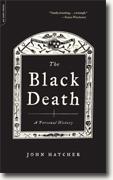The Black Death
John Hatcher
book reviews:
· general fiction
· chick lit/romance
· sci-fi/fantasy
· graphic novels
· nonfiction
· audio books
· author interviews
· children's books @
curledupkids.com
· DVD reviews @
curledupdvd.com
newsletter
win books
buy online
links
home
for authors
& publishers
for reviewers

 |
The Black Death: A Personal History John Hatcher Da Capo Press Paperback 352 pages June 2009 |
|
This book screams “docudrama.” One wonders if it will be made into a TV mini-series, so vivid is its novelistic story line yet accurate its information. Its author, John Hatcher, is an expert in medieval history and professor of Economic and Social History at the University of Cambridge.
It is known that the bubonic plague, spread by rats onboard ships, raged through continental Europe and then over to the British Isles. No one was safe from its ravages, and most victims were dead after a few pain-wracked, terrifying days. People died in droves, leaving no one to bury the dead. Whole settlements perished forever. In this book, we begin first to hear distant rumors of the plague through the ears of the villagers of Walsham and the more informed ears of the Church. We begin to be aware of the real and fearful danger as it approaches ever closer. Those who spin yarns about the unknown fatal disease are careful to avoid making it seem that they have had any personal contact with the disease. That could result in banishment from towns and markets, almost a death sentence in itself, so great was the panic that spread with the ever-encroaching peril. Master John, characterized as a sincere man of his times and a good shepherd to his flock of parishioners both rich and poor, sees his duty and does it, first warning the people after receiving advisories about the plague’s approach from his clerical superiors, then urging them to pray and obey God so as to avoid His wrath, then calming them with ceremonies designed by the Church to invoke awe and piety, then finding that his only daily constant task is to care for the dying, to try to ensure that they will not be deprived of heavenly rest by his neglect. Yet as the Plague hits Walsham in all its fury, people die by the hundreds, and Master John’s ministrations are all but futile. His own faith is sorely tested. The book expounds subtly on the enormous power of the Roman Catholic Church during this period. Hatcher recounts that Master John was berated by his superiors at the height of the Plague’s destruction because he had not spent enough time trying to collect the dues owed to the Church by the families of the dying. The Church that held absolute sway over its members (and there was no other religion) did not give Master John any answers to the burning question of why God was scourging the populace in such a final, horrific way. What had he or anyone done to deserve such a crushing, near-universal punishment? In the aftermath of the Black Death, society had to change. The raw lack of people meant that the able-bodied laborers who were left could and did value their work more dearly. People no longer felt tied to one place for their livelihood. They no longer accepted the word of the Church or the courts as necessarily binding on them. They had survived a sweeping pestilence and were emboldened by their good luck. They had less conviction in the concept of sin, since no amount of good deeds saved their friends and family from the wretched fate of the Plague. Agriculture switched almost immediately and by necessity from small crop-based holdings to large animal-based farms. The rich landowners were no longer as dominant, forced to bargain with and placate an autonomous workforce. In a real sense, the fabric of society as it had been woven was rent and would never be the same again, even though after the Plague passed through, it did not return. Originally published on Curled Up With A Good Book at www.curledup.com. © Barbara Bamberger Scott, 2009 |
|
|
|
 Click here to learn more about this month's sponsor! |
|
| fiction · sf/f · comic books · nonfiction · audio newsletter · free book contest · buy books online review index · links · · authors & publishers reviewers |
|
| site by ELBO Computing Resources, Inc. | |
 What Hatcher has done, and done well, is to tell the tale of the Black Plague that swept through Europe in the 14th century from the viewpoint of a single English village, drawing from extant parish records of the village of Walsham. Positing the daily life of a priest known as Master John, the author is able to sweep out across a broad landscape to show us how the Plague crept into the village, wrought its devastation and passed on, with permanent irrevocable consequences.
What Hatcher has done, and done well, is to tell the tale of the Black Plague that swept through Europe in the 14th century from the viewpoint of a single English village, drawing from extant parish records of the village of Walsham. Positing the daily life of a priest known as Master John, the author is able to sweep out across a broad landscape to show us how the Plague crept into the village, wrought its devastation and passed on, with permanent irrevocable consequences.